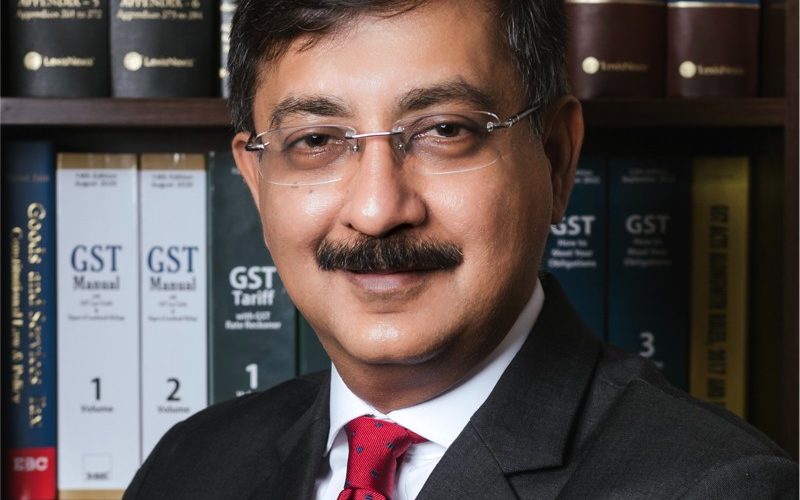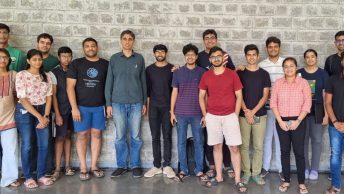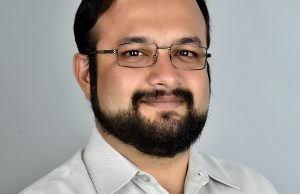In conversation with Senior Advocate Tarun Gulati, one of the most sought-after lawyers in the country, particularly in the area of Taxation. An Allahabad University graduate, he has over three decades of experience representing leading industrial conglomerates on various contentious issues of law before the Supreme Court as well as several High Courts. In 2019, he was designated as a Senior Advocate by the Allahabad High Court.

The interview begins by seeking insights from his journey in the profession and what skills and values it takes to be successful in this field. We also ask for his opinion on a contemporary and controversial point of law dealing with the disallowance of ‘Cess’ as business expenditure under the Finance Act of 2022. In particular, we seek his opinions on the validity of such a retrospective amendment as well as how to interpret the provisions.
The following are some edited excerpts from the interview:
Q1. Was law an obvious choice for you right from the very beginning or was there a different area you wanted to pursue as a young student?
My journey started in a very different way. While I belong to a family of lawyers and judges, it was not the first choice. As a student, I was academically very interested in accounting and finance and I took very naturally to it. So, I decided to pursue both the Law and the Chartered Accountancy course simultaneously. It was an exploratory period for me, as I tried many different areas and subjects. But in the end, I found my solace in Law. The key is to zero in on a specific interest or inclination after having explored multiple avenues.
Q2. Would it be right to presume that your experiences and learnings as a chartered accountant gave you an insight into the practice of accountancy, which in turn benefited your Tax Law practice?
Having a finance background definitely gave me much-needed clarity. It allowed me to truly appreciate my profession. This clarity is very important as once a person realises and commits to a certain direction in life, it leads to a good amount of success.
Q3. You worked as a junior under Senior Advocate Joseph Vellapally, a renowned Tax lawyer at that time. How would you describe your journey in that chamber and what are the life lessons that you learned over there that the current generation of students can learn from?
Mr. Vellapally was not only one of the best Tax practitioners but also a fantastic human being. There was a lot to learn from him, be it professional knowledge or personal life lessons that I continue to hold dear to my heart. He had a very small practice and an even smaller office. This allowed him to give more time to each case and generate better work than his peers. He was instrumental in introducing me to the area of Indirect Taxation and a variety of commercial litigation work, which made me realise that Taxation is not an isolated field and a practitioner must have knowledge regarding all other fields of Law. Observing him taught me many things about how one must conduct themselves in court during an argument, moderate expectations, and the level of integrity one must maintain in order to be successful and more importantly, well-respected in the field.

Q4. How different or how similar was Tax Practice, let us say two decades ago versus now? Do you see any changes or shifts in the dominant trends in litigation or has it largely remained the same?
There has been a change over the last two decades regarding how we practice Taxation and how we interact with clients. The field overall has become aggressive right from the authorities to the lawyers. There is a lot more competition as the dynamic between lawyers and clients have changed drastically. Lawyers market themselves a lot more on all available mass media. Clients have also gotten more aggressive in their demand for results, be it the pace in which their matter proceeds or the ultimate outcome of the case itself. COVID-19 has also had an impact on the way interactions and meetings have taken place between the various stakeholders, making senior counsels more approachable. Such changes are really appreciated, but there must be a line drawn somewhere perhaps. It is no longer a small and niche field like use to be, and people are quite well-informed these days. While I do appreciate a time when things were different, and truth be told I would not mind going back to such a time, we must also accept this new reality of social media and internet marketing, even if we do not wholeheartedly embrace it.
Q5. Picking up on that last thought on technology and how it has had an impact on the legal profession, for the past two years courts have been functioning online with video conferencing becoming a norm across high courts and the Supreme Court as well. What do you see as a difference between making submissions online versus offline? Do you have a preference for any one of them and is the ability to convince a judge any different between the two?
Advocacy is not just about the Law; it is also about interpersonal skills. It does not matter that one makes all the right arguments if they cannot develop a connection with the judge before them. It is not possible to use a full range of expressions and body language during online hearings and hence it is not as effective as making submissions physically. While the efficiency of a hearing does increase in an online setting, in-person hearings are still preferred, especially if the issue is contentious.
Q6. Moving on to discussing the issues of law dealing with the disallowance of cess as a deduction. In light of this development, what are your thoughts on the constitutional validity of the retrospective application of the Finance Act amendment?
In my personal opinion, keeping the constitutionality of the amendment aside, I believe that it is an unfair provision that has arisen due to executive overreach and the lack of reasoned debate over such legislation in the Legislature. It goes against various High Court judgments like the Sesa Goa judgment of the Bombay High Court and the Chambal Fertilizers judgment of the Rajasthan High Court. These are sound case laws that create a distinction between the terms Tax and Cess. Although the term Cess was later deleted, the distinction remained. The amendment, which is retrospective and substantive in nature rather than being a mere clarificatory amendment, can be struck down as arbitrary. Hence, this question of arbitrariness is the main issue.
(Extracts from the Memorandum to the Finance Bill, 2022)8. Since the judgments of Rajasthan High Court and Bombay High Court did not consider the judgment of Hon’ble Supreme Court discussed above, the judgments of these two High Courts appear to be per incuriam. It may be mentioned that in paragraph 578 at page 297 of Halsbury’s Laws of England, Fourth Edition, the rule of per incuriam is stated as follows:
“A decision is given per incuriam when the court has acted in ignorance of a previous decision of its own or of a court of co-ordinate jurisdiction which covered the case before it, in which case it must be decided which case to follow; or when it has acted in ignorance of a House of Lords decision, in which case it must follow that decision; or when the decision is given in ignorance of the terms of a statute or rule having statutory force.”
9. From the above discussion it may be seen that the interpretations of two High courts and various ITATs are against the intention of legislature and not in line with the judgment of Hon’ble Supreme Court. Hence, in order to make the intention of the legislation clear and to make it free from any misinterpretation, it is proposed to include an Explanation retrospectively in the Act itself to clarify that for the purposes of this sub-clause, the term “tax” includes and shall be deemed to have always included any surcharge or cess, by whatever name called, on such tax. Amendment is made retrospectively to make clear the position irrespective of the circular of the CBDT.
10. This amendment will take effect retrospectively from 1st April, 2005 and will accordingly apply in relation to the assessment year 2005-06 and subsequent assessment years.(Extracts from the Memorandum to the Finance Bill, 2022)
(Section 50 of the Finance Bill, 2022 which deems claims of cess as ‘under-reporting of income retrospectively)50. In section 155 of the Income-tax Act, after sub-section (17) and before the
Explanation, the following sub-section shall be inserted, namely:—
“(18) Where any deduction in respect of any surcharge or cess, which is not allowable as deduction under section 40, has been claimed and allowed in the case of an assessee in any previous year, such claim shall be deemed to be under-reported income of the assessee for such previous year for the purposes of sub-section (3) of section 270A, notwithstanding anything contained in sub-section (6) of section 270A, and the Assessing Officer shall recompute the total income of the assessee for such previous year and make necessary amendment; and the provisions of section 154 shall, so far as may be, apply thereto, the period of four years specified in sub-section (7) of section 154 being reckoned from the end of the previous year commencing on the 1st day of April, 2021:
Provided that in a case where the assessee makes an application to the Assessing Officer in the prescribed form and within the prescribed time, requesting for recomputation of the total income of the previous year without allowing the claim for deduction of surcharge or cess and pays the amount due thereon within the specified time, such claim shall not be deemed to be under-reported income for the purposes of sub-section (3) of section 270A.”.
This can be seen as a case of executive overreach, as the memorandum of the amendment is the one that is rendering these High Court judgments as per incurium. On this sole point itself, the amendment can be struck down by the Courts.
Secondly, the use of the word clarification does not make it a clarificatory amendment. The deletion of the word “Cess” from Section 48(2) of the Income Tax Act cannot be interpreted to mean that it was the legislative intent in 2005 to consider Cess and Tax as one and the same thing. To speak of Section 155(18), power has been given to the Assessing Officers to impose obligations on Assessees to comply retrospectively or face penalties. This again is an arbitrary power granted to the Assessing Officers. The bottom line being: The Executive must not be allowed to override high court judgment.
Q7. This is quite intriguing. In this context, Section 115(18) allows the officer to pass rectification orders for a period of up to four years beginning from April 1st , 2021. How far back can the officer really go to pass rectification orders? How can this be seen in light of the larger trend or reopening and reassessing older Taxation cases as well as recent amendments made to Section 148 of the Income Tax Act?
Until recently, the picture was quite clear. The Mepco case and the Simplex case had clearly elucidated that rectifications could not be made on the basis of a subsequent judgment or the re-assessment of an older judgment. The larger limitation contemplated by this amendment is also grounds for a challenge as judgments from 15-16 years ago cannot be picked up again. The Supreme Court through cases has elucidated that subsequent amendments cannot give life to remedies that are already dead. Such a principle applies here as well, as per the JK Synthetics Case. Hence, if a case from 2005 is picked up, the amendment can be asked to be read down due to arbitrariness.

Q8. In light of this amendment, the Vodafone and the government’s promises of upholding rule of law and not enacting retrospective amendments and law, do you think anything has changed since the last year and is there a hope for change?
Unfortunately, even the judgment of an International Tribunal (in the Vodafone matter) has not been able to change the views of the government. The government continues to keep silent on such proposals that call for the end of retrospective laws and amendment. We must stop this sort of practice to show that our system of law is fair towards international and domestic assesses.
Q9. A tangential question in this context. How do you advice clients with respect to such retrospective amendments? Is it a consideration for lawyers to advice regarding such a paradigm?
Not really, as we live life in the hope that the government will one day learn from this. Yes, it can be extrapolated that in every case the government can enact retrospective laws and re-litigate. But as a practitioner, I do not advice my client regarding such matters as it is up to the government to clean up its act and such amendments cannot be anticipated.
Q10. One last question, what advice what you give to law students, junior lawyers, and CAs who are just entering the field?
Taxation cannot be practiced in a cocoon. The various allied laws and fields like Civil laws, criminal laws, and other economic criminal offenses are very important for a tax lawyer. Before going into a specialisation, it is important to have a good variety of work in these fields.
In law school, the study of tax is not as detailed. Being a super-specialised subject, it requires being up-to-date and with latest trends. Having a diploma or an LLM would help in tackling the field as it involves a deeper understanding. Contrary to popular belief, Taxation is an interesting subject that has its nuances and we hope that more students take it up as a subject and make it their profession!
situs toto



